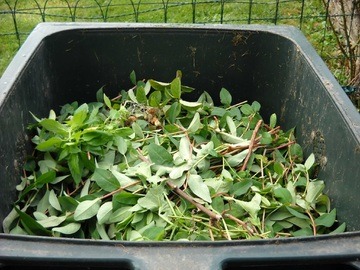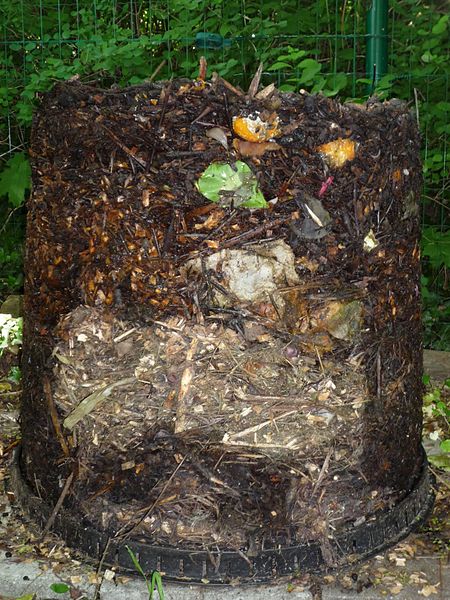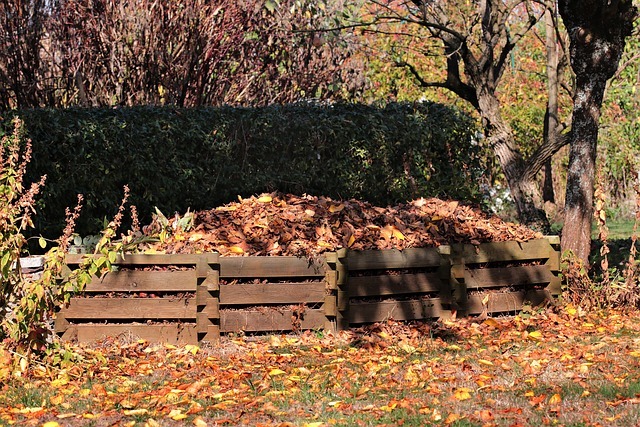Hi, if you’ve ever asked yourself if leaf compost is good for a vegetable garden, this article is for you. And if you haven’t, well, you just might want to stick around and learn something useful.
In this article, we’ll look at leaf composting in relation to vegetable gardening. By the time you’re done with this article, you’ll
- Know the benefits of leaf compost.
- Learn how to make a leaf compost and how to find leaves for leaf compost easily.
- Be able to know when your compost is ready for use – (that is if you decide to make your own compost).
So let’s quickly answer the first question…
Is Leaf Compost Good For Vegetable Gardens?
The answer to that question is very simple – yes.
Using a leaf compost is a natural way of adding nutrients to the soil. We shared some of the reasons why this is good in the lines that follow below.
How do you gather the leaves?

Contents
Improved plant and root growth.
Composts, especially leaf composts, add organic matter and the trace elements required by plants into the soil when they decay. This way, nutrients are easily accessible to your plant at no extra cost, and you do little work.
Improves soil porosity.
Composting, when rightly done, improves soil porosity. The presence of compost in your garden provides a good habitat for soil organisms. These organisms enjoy the kind of environment provided by the compost, and would readily visit and carry out activities such as burrowing.
The burrowing activities of earthworms, insects and several other soil organisms, loosen or break up the soil particle, thereby improving the ease of movement of water and air through the soil.
Prevents Erosion
One of the effects of composts—leaf or any kind— is that it prevents erosion. One may wonder, how does adding compost to soil prevent erosion?
It’s not the action, it’s the effects of the action. Let’s not forget that the compost is rich in nutrients which become available to the plant once added.
The plants make use of the nutrients and grow stronger because of it. Their roots also grow stronger and have a firm anchorage in the soil.
This in turn keeps the soil particles together during a wind or water erosion.
All Organic – No Chemicals
Leaf composts, or composts in general, are more beneficial to the soil than chemical fertilizers, though the latter is good in its own right. Apart from its purely natural source, composts encourage the presence of necessary soil organisms.
Over time, with the use of chemical fertilizers, the soil tends to become either so acidic or basic to an extent such that these organisms may find that location unconducive for themselves.
Composting Improves Soil pH
If your soil is too acidic or basic, plants will have a hard time growing in it until it gets treated.
Helps Retain Water
It improves the soil’s ability to hold moisture, and we know the importance of water to plants. If soil loses water quickly, it places a strain on the plants. Composting serves to prevent situations like that.
There are more advantages of composting, and these advantages can be gotten from leaf composts too. However, there’s one downside to composting.
Composting takes time and energy, and gives off a bad smell during it’s period of preparation. Yuck! Your kids may want to puke at the sight!
Composting takes the following…
Time: It can take anytime from 6—12 months but can be sped up too;
Energy: it requires your constant attention as you have to turn it over for aeration and moisten it a bit.
And brings…
Smell: As with everything undergoing decomposition, bad smells are to be expected. However, the end product of properly made compost doesn’t smell bad; it has an earthy smell and wouldn’t cause your garden to stink.
How To Make Leaf Compost For Vegetable Gardens

Stage 1 – Leaf gathering
No sir/ ma’am, you can’t skip this stage. It’s really essential to making your leaf compost. What is even more essential to the compost is the kind of leaves to gather.
Fresh dead leaves—these are rich in carbon—are recommended for your compost as they balance the nitrogen present in your garden soil.
Stage 2 – Leaf shredding
This stage is simply to make the decomposition process of the leaves faster. Large leaves take a long time to decompose, and so it is recommended that you shred the leaves.
How? Well, you could use a shredder or a mower if you don’t have the former. Just gather the leaves in a pile and push your mower over them. You may need an assistant to help gather the leaves again.
Use a good rake to gather them.
Better still, if the leaves were on your lawn, you can mow over them on the lawn and then gather both the leaves and the grass clippings into the compost.
Another way of speeding up the process is to add a source of nitrogen to the pile of leaves. Freshly mown grass or manure will do fine. Keep this in mind though— one part nitrogen source to five parts leaves.
Stage 3 – Prepare a Location
Well, you need a place to prepare and hold your compost. You could invest in a compost bin, one that has holes that allow sufficient aeration of the compost. Or, you could designate a patch of land to carry out the process on.
Make sure the site of the compost bin is not close to residential areas. If you’re composting in your yard, choose a location that is farthest from the house to minimize the smell.
Stage 4 – Caring For The Compost
After gathering your leaves plus nitrogen source in a pile, we recommend you turn it over twice a week. You could use a shovel or rake for that. Also, you want to make sure the pile is kept moist, not wet but moist.
Add kitchen debris to the compost if you wish, but don’t add anything plastic as those ones won’t decay.
And finally:
How Do You Know When Compost Is Ready?

A few days into your composting journey and you’ll probably start to think, how do I know this compost is ready for use?
- How does it look? Does it look loamy? Can you describe it as dark and crumbly? If yes, then it may be ready.
- If you are not too sure, another way to test it is by it’s smell. Does it still smell bad, or does it have an earthy smell? If you answered ‘yes’ to the second, it is ready.
- You can recognize just a few of your starting materials. If you can still recognize most of what you started with, give it more time to cure.
I hope you’ll consider composting and all the benefits it brings to your plants and soil.
Getting More Leaves For Composting
If you have a large garden and you’d like to compost with more grass, simply make some flyers and paste it around the neighborhood and ask the locals to give you a little part of the leaves they gather from their yard.
Take only what you need and don’t turn your compound into a leaf dump.
When Should You Add Compost To Your Garden
A lot of people recommend adding compost to your garden in late fall. This, however, depends on your region.
How Much Compost Should You Add To Your Vegetable Garden?
Spread about one to two inches of soil into the garden and then use a tiller to till the ground and mix both the soil and the compost.
If you have a large garden, put the compost into the holes where the seeds are using a hand trowel.
- How to Get Potatoes to Sprout Eyes: Detailed Growing Guide with 3 Options - July 31, 2023
- Weight of a Medium Potato: Revealed in Detailed Guide - July 29, 2023
- Maris Piper Potatoes: 9 Substitutes You Should Know About - July 27, 2023
Hello! I’m Jessica Zander, a garden coach and consultant based in the Boston area (zone 6b), offering virtual consultations across the country and Canada.
I’ve been passionate about gardening since the early 1990s, and in 2022, I launched You Can Do It Gardening to empower individuals to feel more confident in their gardening endeavors.
Following a 30-year career in nonprofit finance and operations, I transitioned out of that field in mid-June of 2023 due to the growing demand for coaching services. Interestingly, my years of presenting financial statements to boards and finance committees proved to be valuable experience for teaching people about gardening! I enjoy sharing skills, providing guidance and suggestions, and collaborating efficiently with clients to make significant improvements to their outdoor spaces, both small and large. I also regularly teach at the Arlington Continuing Education and Cambridge Adult Education.
My approach is direct and practical, akin to Mary Poppins, but tailored to your garden. Clients find satisfaction in saving money and taking pride in their own gardening achievements.


Turn your vegetable garden soil, then mix in partially decomposed organic materials. The best choices here are coffee and tea grounds, finely chopped vegetable or fruit matter from kitchen scraps, and fireplace ash or sawdust.
Yes, Charlie. For the ash, well, dampening it before joining it with the compost will be a good idea.
Composting doesnt have to smell. If its orepared well, has enough nitrogen, is kept moist and gets air it will hot compost and in weeks you’ll have great, finished compost. If your compost stinks you may be getting anaerobic action.
That’s true, although it doesn’t entirely rule out the fact that compost does smell.
The rotting material doesn’t exactly smell like a summer rose.
Agreed.